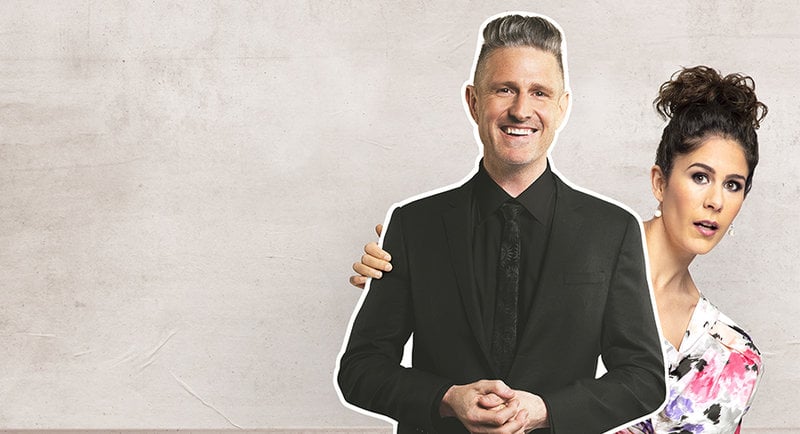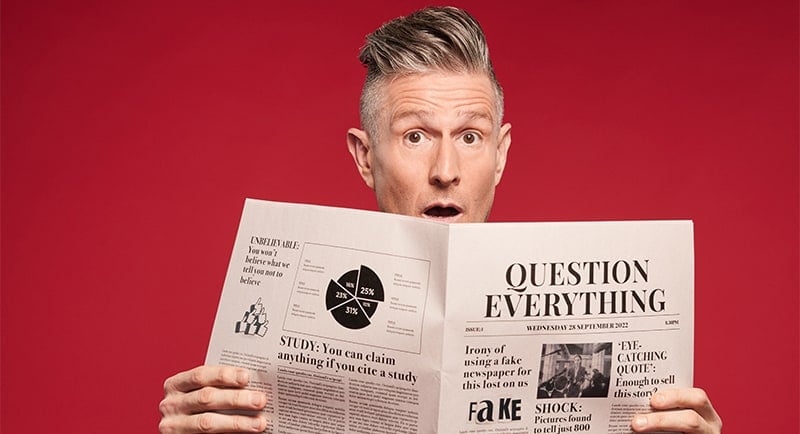In a world dominated by fake stories, false claims, scams, frauds, and outright lies, Question Everything is making its way back to screens to separate the grains of truth from the chaff.
Joined by a rotating panel of comedians from around Australia, hosts Wil Anderson and Jan Fran will be diving head first into the news, real or otherwise – allegedly.
Mediaweek spoke to Wil Anderson ahead of the new season premiering Wednesday, September 28th, at 8.30pm on ABC TV and ABC iview.
Whilst Anderson says that shows always tend to “take a little while to find their feet and what it is that they’re actually trying to do,” the first season of Question Everything had a whole new set of hurdles to contend with. In a brutal bit of bad timing for a show that involves bringing in guest panellists, the first week of the show’s pre-production was the first week of the Sydney lockdown.
“We had to make the show not just without comedians from all over Australia, but not even with comedians from all over Sydney,” says Anderson. “There were certain local government areas that we couldn’t access at the time.
“We had a map of local government areas in our office with which comedians lived in which area. Some of the areas of Sydney are quite high-density for comedians – the Inner West, for example. There was a point where the infection was getting closer and closer to the Inner West, and we were watching it thinking ‘If the Inner West falls, the show falls! That is our wall, the White Walkers are through and we are done!’”
Thankfully Sydney’s Inner West never totally fell to the constant march of Covid, meaning that the Question Everything team were able to get by with enough guests for the season. The studio audience, however, was a whole other story.
“What we had to put on screen changed substantially. We were going to do a show where most of the heavy lifting was going to be done with the panel telling jokes, that was the whole design of the show. Of course, suddenly, we didn’t have a studio audience.”

Needing to think on their feet, the team worked to get the job done no matter what.
“We would rehearse with these scripts that looked like redacted government documents that Donald Trump might have in a box at Mar-a-Lago, because we would blank out all the jokes. The only chance we had for an audience laugh on the night was if Larry on camera three enjoyed the joke, and he couldn’t enjoy that joke if he had heard it five times already during the day.”
Way back in precedented times, the second season of a show would be the perfect time to take a look back at and make some tweaks. Anderson says the Question Everything team aren’t too worried about that, and are treating this season more as “a second chance to make a first impression.”
“Normally we really would look at what we did last season and ask what did we do right? What did we do wrong? How do we improve things we got wrong? How do we make the things that we got right better?
“We didn’t do that, we just consider last year to be a thing that happened that isn’t really instructive to us in any way. We’re looking at this season as a real opportunity to have a second go at making the show that we wanted to make in the first place.”
Despite the fresh start, Anderson says both the aim of the show and the structure will be sticking closely to what viewers saw in the first season.
“Our first segment is a general cover of the news – what would you think of the news if you only read the headlines, the clickbait, and the sensational aspects of the story that gets passed around? If you went to a barbecue on a Friday afternoon and you had a conversation with someone who doesn’t read the news, what would they think the news is versus what the news really is?
“In the second segment, what we’d really like to do is take one of those stories and do a bit more of a deeper dive into the misinformation around it.”
At the heart of Question Everything is the idea that knowledge is power. Whilst the show itself is lighthearted, Anderson says that he hopes people will get more than just laughs.
“We always say on Gruen, one of the most effective things we can do is if we can talk about an ad, then every time somebody sees that ad they think,’ Oh, I know the trick here’, or ‘I know what it is they’re trying to do here’. That’s our hope with this show.
“We’re in the business of trope identification, and then, hopefully, comedically extrapolating it – so that the next time you see clickbait about an unrecognisable celebrity or the thing that you’re doing wrong, you understand the motivation behind why you’re about to click or not click on that story.”
